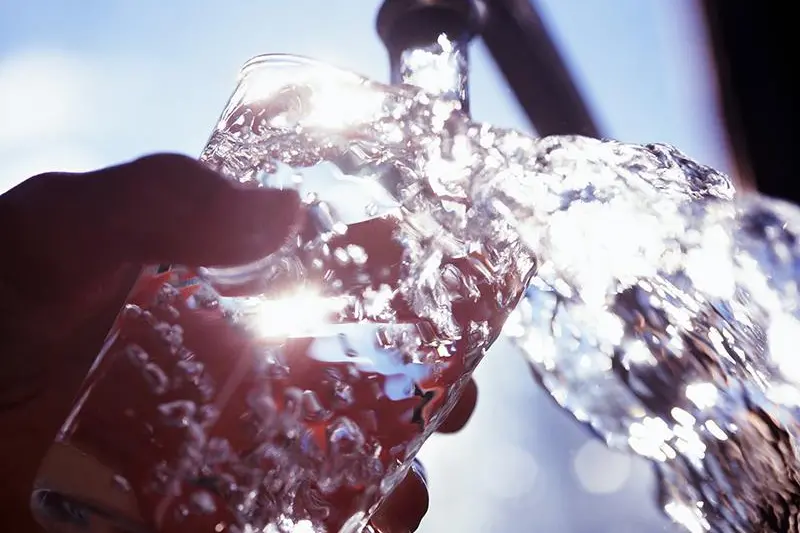PHOTO
For a water-stressed region like the Middle East, every drop of water saved counts, according to Chandra Dake, CEO of Dake Rechsand, the company behind 'breathable sand technology,' which converts low-value desert aeolian sand into sustainable products.
"Water doesn't magically appear when we turn a tap. Behind that simple final interface lies a highly energy-intensive network. Water and electricity often come to our homes across hundreds, and sometimes thousands of kilometres, from where they are sourced or generated," he said.
Dake, who is also Executive Chairman & Group CEO, Dake Group, said the Middle East is among the fastest urbanising regions globally, while Gulf states like the UAE and Qatar are wholly urbanised.
"According to the World Bank, the world's urban population has exceeded 50 percent for the first time in human history. This will inevitably lead to high concentrations in terms of population. Relying entirely on a supply grid, in which water is pumped into cities at a huge energy cost, has ecologically disastrous consequences," he told Zawya.
For UAE, which is ranked among the most water-stressed countries in the world with an average rainfall of 100 mm per year, Dake sees an opportunity in using urban rainwater harvesting as a sustainable water supply resource.
Decentralised rainwater harvesting
While acknowledging that allocating vast tracts of land for catchment areas and reservoirs in modern cities like Dubai is not always possible, Dake said decentralised rainwater harvesting could be a feasible solution.
"Anyone who operates and administers an IT network will tell you that a distributed network architecture makes a system more robust, reliable, and tolerant of a single component or segment failing. Decentralised rainwater harvesting can bring that same flexibility and resilience to urban water supply infrastructure, besides being a much more energy-efficient model," he said,
It is important to have several smaller reservoirs within a city's borders - preferably underground - which store rainwater harvested within their proximity. Such a system would eliminate the need for water to be pumped across long distances or allocate large tracts of land for the catchment.
"For the UAE, a combination of these decentralised underground reservoirs and its successful cloud seeding programme could be a lifesaver," he added.
The company's 'breathable sand' technology, Dake explained, transforms fine desert sand into products that retain water while also remaining air permeable.
"Tiles and kerbstones manufactured using our technology result in hydrophobic surfaces, ensuring that every drop of precious precipitation can be directed towards reservoirs and harvested. Reservoirs built using the same material can store water and keep it fresh for up to seven years without chemicals or electricity-driven aeration. The second capability allows underground water storage beneath any public or private area, eliminating the need for land especially allocated for reservoirs."
Gaining acceptance in the UAE
'Breathing sand' technology has evoked serious interest among the UAE federal authorities, the different emirates, and local companies, Dake said, adding, discussions are on with Abu Dhabi Agriculture and Food Safety Authority (ADAFSA) and SILAL.
“The Ministry of Education has pioneered the use of our technology in a few schools, and it is earmarked to be used for planting trees in schools sustainably," he said.
The Ras Al Khaimah Municipality has agreed to an initiative that will involve planting 1,000 trees as the first phase of a strategy that results in the creation of urban forests.
Dake Rechsand is also technology and implementation partners for tree-planting projects, with Jebel Ali Resorts, Nakheel, and several private villas. “We are currently discussing with a large corporate entity interested in setting up an agricultural initiative over 150 acres,” Dake said, without revealing details of the project.
The company also plans to establish in Saudi Arabia through the government's Green Riyadh initiative, which involves planting about a million trees in the Riyadh area.
In Qatar, the Public Works Authority - Ashghal - has agreed to two pilot projects, Dake said.
"One will address the sand clogging of drain gullies, which is a common problem they face after even rainfall. They are interested in turning this problem into a positive one using our rainwater harvesting enabling solutions. The second pilot will use our technology for tree-planting drives and urban landscaping."
The Dake Rechsand CEO believes that decentralised harvesting of precipitation could once again connect humans to rainwater as a precious and sustainable resource.
(Writing by Anoop Menon; Editing by Seban Scaria)
Disclaimer: This article is provided for informational purposes only. The content does not provide tax, legal or investment advice or opinion regarding the suitability, value or profitability of any particular security, portfolio or investment strategy. Read our full disclaimer policy here.
© ZAWYA 2021




















